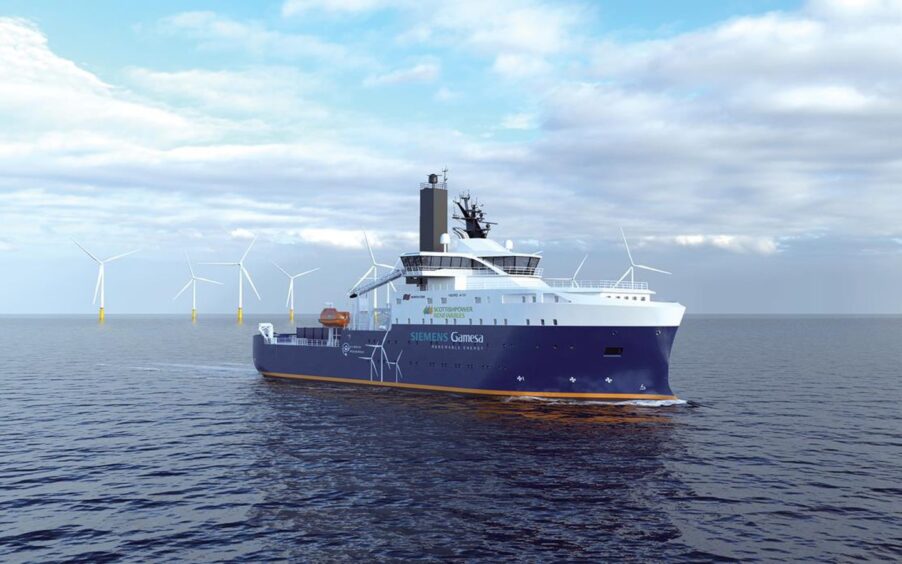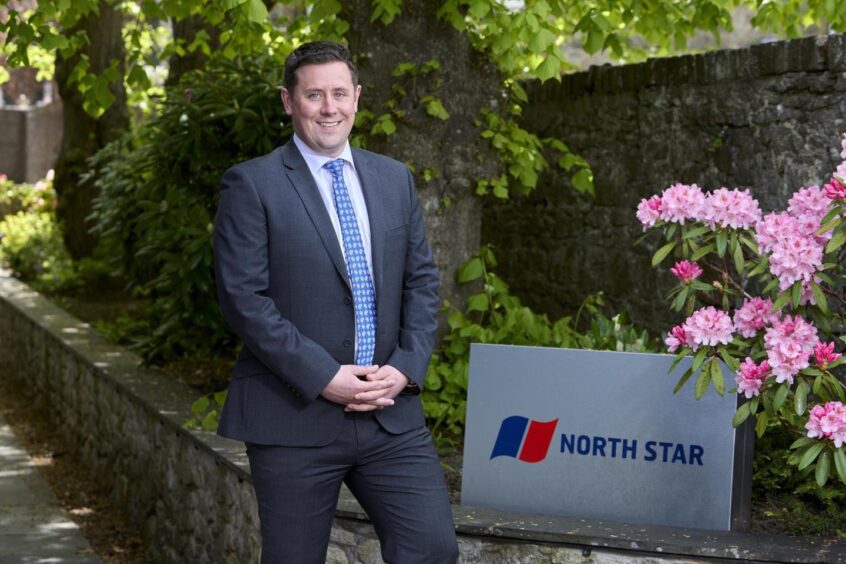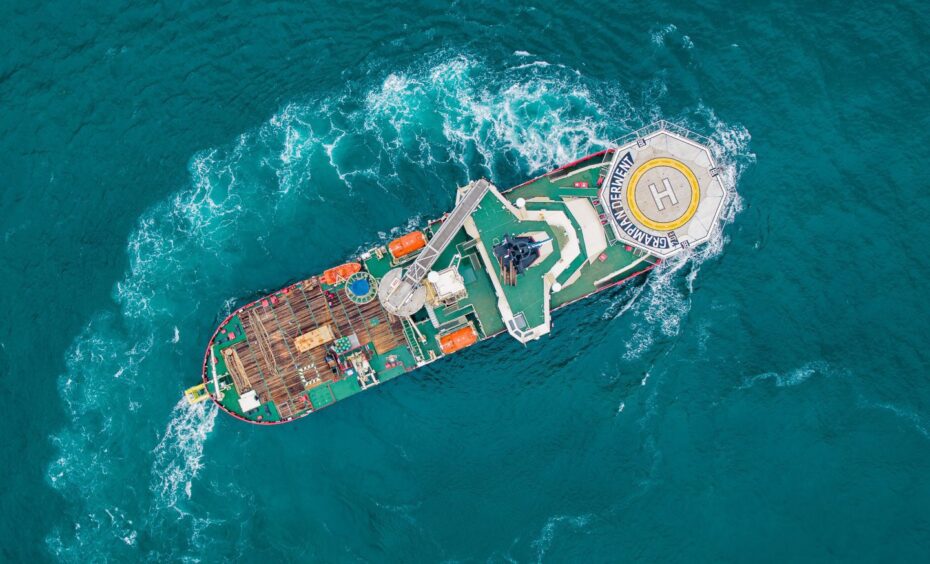
Investment is crucial to building the Scottish renewable energy supply chain. Without funding, companies that have traditionally been in oil and gas will struggle to transition into clean energy.
However, lenders have not always been eager to provide money to companies active in fossil fuels.
This puts both Scotland and the UK’s energy transition at risk of failing before it even starts.
North Star, a major operator of vessels working in the North Sea, was one company that ran into challenges when it went to market to raise finance.
The group operates a fleet of 41 multi-purpose ships operating out of bases in Aberdeen, Lowestoft, Newcastle, and Hamburg.
With much of its business coming from oil and gas operations, North Star was looking to transition into offshore wind.
“That transition happened really from 2020 onwards, when we won our first major project at Dogger Bank,” North Star CFO Fraser Dobbie said.
With four 10-year charters signed to provide service operation vessels (SOVs) for the wind farm, North Star ordered four newbuilds to work on the project, three of which have been delivered.
The firm also has a further four newbuilds underway – an SOV for EnBW’s He Dreiht wind farm in Germany, another for Siemens Gamesa Renewable Energy at the East Anglia THREE project, and its first two larger commissioning SOVs to further support its offshore wind clients.
With contracts agreed and signed, the Dogger Bank deal provided a solid foundation for North Star to secure finance to fund the newbuilds.
However, volatility in the debt market meant that North Star wanted to move away from that model, using individual contracts as the basis to finance its newbuilds.
“If you get your debt assumptions wrong and then win the work, but then you don’t have the capability to raise that project finance on the terms that you’d assumed, you’ve got a big problem,” Dobbie explained.
“It effectively means you’ve signed a contract but you can’t build the boat.”
Instead, the company opted to raise facilities at a corporate level, allowing them to bid on work knowing the money was already secured to provide the new vessels.
Catch 2022
In February 2022, North Star started the process to raise funds to help its entrance into the offshore wind sector.
However, when it went to market to find lenders, it ran into a major issue.
“At that point in time, all of the business’s cash flow was from oil and gas,” Dobbie explained.
“There was a bit of a ‘computer says no’ response that we were getting, particularly from commercial and clearing banks. They were just saying that they don’t have a mandate to invest in businesses like yours.”
Banks at that point were largely avoiding investing in oil and gas-based businesses in favour of companies focused on clean energy.
“That was incredibly frustrating because we were trying to raise money so that we can invest in purpose-built assets to service the offshore wind industry,” Dobbie said.
“We were in this weird position where our oil and gas business completely underpinned our capability to actually win work for our clients, but it causes challenges for us in terms of our ability to raise finance that we need to build the ships.”
Funding package
At the same time that North Star was struggling to raise finance, the recently founded and Scottish Government-owned Scottish National Investment Bank (Snib) was also looking for businesses to invest in.
With a mandate to invest in underserved sectors to create environmental, social and financial value for Scotland, developing the country’s offshore wind sector was a major target for the bank.
“We’d identified a lack of specialist offshore wind vessels needed to deliver the offshore generating assets that were forecast over the next 10 years or so,” Snib executive director for net zero Jimmy Williamson said.
Given the size of the capital and expertise required, Snib believed a start-up or new business would be unable to deliver the vessels, and instead looked to a business active in a similar industry to offshore wind, such as oil and gas.
“We were seeing signs that banks were being more hesitant and withdrawing from oil and gas-focused businesses,” he said,
“This gave us a mandate to play in our role as a development bank. There has to be some form of structural or market liquidity gap for us, as we’re not here to compete with other banks.”
Snib ultimately provided £50m of funding to North Star, which formed the cornerstone of a broader £140m finance package, with IFM Investors, Edmond de Rothschild’s Bridge platform and RBC Capital Markets providing capital
“Snib was able to look to the future and the impact that that investment would have on a company like us,” Dobbie added.
Changing tides
Another funding round followed in June this year, where North Star secured further debt investment of up to £425m – an initial commitment of £225m with an accordion capacity allowing a further £200m.
Existing lender IFM Investors was joined by ABN AMRO, AIB, NAB, Royal Bank of Scotland and RBC.
The funds aimed to accelerate its ambition to add 40 hybrid SOVs to its fleet by 2040.
While Snib wasn’t involved in the latest funding round, its role in the previous round helped ensure that other lenders would provide money to North Star.
While banks have broadened their perspective, William warned that legacy fossil fuel companies are still facing challenges with securing finance.
“Some banks have had difficulty creating a consistent narrative around how they deal with oil and gas businesses,” he said.
“The political and shareholder environment generally hasn’t helped and their shareholders have demanded that they decarbonise their business models.”
But he has noticed a change in the market.
“There’s more of a focus on energy security which translates into more support for oil and gas business models,” he said.
“We’re starting to see more signs of business models emerging where you’re decarbonising and actually making existing oil and gas infrastructure more sustainable in its own right.
“However,” Williamson added. “We’ve held a number of dinners with C-Suite individuals in Aberdeen and the messaging they’re hearing from companies across multiple oil and gas connected sectors is it’s still really tough.”
Blueprint
The North Star deal provides a blueprint for Snib’s ambitions for the next generation of Scotwind supply chain investments.
With the offshore oil and gas workforce providing a solid core of workers and expertise, companies active there make a natural target to transition to work in renewables.
“We’ve made it part of our mandate to be educated and informed about where there are natural adjacencies,” he said.
“The oil and gas service sector has changed fundamentally and has almost entirely embraced the renewables sector and the opportunity in a way that it hadn’t five years ago.”
In particular, Williamson pointed to SOV operators like North Star, or asset maintenance service providers as natural parts of the offshore wind supply chain.
“We see strong parallels in the journey that we’ve experienced with North Star where there are markets in ports, cranes or manufacturing facilities,” he added.
Snib has been active in funding projects in these sectors. It provided half of a £100m investment into Ardersier Port owner Haventus, with the UK Infrastructure Bank (UKIB) providing the rest.
The funds would help upgrade the facility to support industrial-scale deployment of fixed and floating offshore wind. This includes the creation of a 650m quay wall and associated quayside.
Inverness-based Aurora Energy also received funds from Snib, £20m to expand its network of regional training hubs and workshop facilities.
This will help Aurora to service projects across Scotland’s renewable energies sector.
With investors still hesitant to invest in renewables, either due to a lack of revenue visibility or because new technologies, like hydrogen and tidal, are still proving themselves, Williamson sees a “clear role for us in showing leadership and investing in business models.
“We need to show that there’s a return capable of being made,” he added.
“This is part of our conscious strategy that we are looking to catalyse markets, use our capital to enable businesses and give management teams the confidence to go off and use that capital responsibly.”
Like North Star, he expects that Scotland will see similar stories where businesses can use Snib funding to scale themselves and gain access to the next level of capital.
Recommended for you

 © Supplied by North Star Shipping
© Supplied by North Star Shipping © Supplied by Scottish National In
© Supplied by Scottish National In © Supplied by North Star
© Supplied by North Star